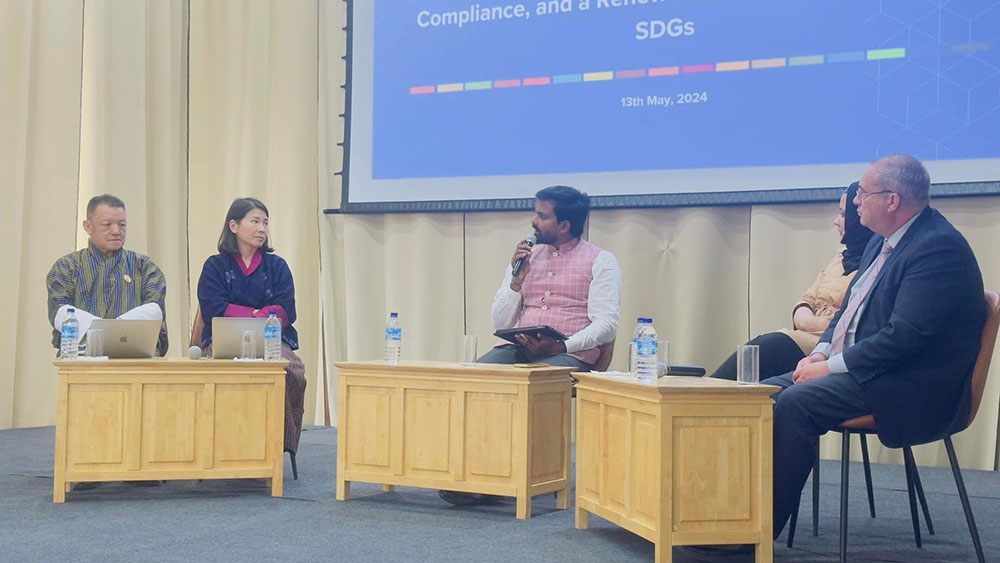
The country is grappling with significant challenges in its tax policy, tax administration system, and Information Technology (IT) infrastructure.
These weaknesses impede the establishment of an efficient taxation system and the provision of improved tax services to the citizens.
According to the Department of Revenue and Customs (DRC) records, Bhutan presently counts 116,000 taxpayers, including corporate, business, and personal income taxpayers. The current tax to Gross Domestic Product (GDP) ratio is approximately 13 percent.
DRC’s Director General, Sonam Jamtsho, said that Bhutan’s current tax policy relied on assumptions, incentives, and deductions.
He noted that the Income Tax Act 2001 has become outdated and fails to accommodate the changing landscape of digital assets, cryptocurrencies like bitcoin, and blockchain technology.
He made these remarks during the inaugural national dialogue on tax justice, enhanced compliance, and a renewed social contract for the Sustainable Development Goals (SDGs) at the Jigme Singye Wangchuck School of Law in Paro on May 13.
Presently, the top 20 percent of taxpayers in Bhutan contribute 80 percent of the total tax revenue. Sonam Jamtsho said that there was a need to reassess this situation, as the country treated all taxpayers uniformly until now.
He said that citizens were willing to fulfil their tax obligations, but the online system was not operating efficiently. “To pay income tax, we are still reliant on the old RAMIS system, which is not very effective.”
Tax officers, he said, were burdened with extensive manual tasks, diverging from their primary mandate of tax assessment and collection.
DRC has developed an electronic customs management system (eCMS) to streamline online import and export procedures. It is also revising the Income Tax Act to make it more relevant to modern times.
Sonam Jamtsho said that the aim was to simplify procedures, regulations, and rationalise tax ranges, along with the introduction of new provisions.
To reduce the workload on tax officers, the DRC has recruited additional staff to handle manual tasks such as data entry.
Tax and SDGs
Robust finance is seen as an important component in fulfilling the 17 SDGs under the 2030 agenda of Sustainable Development. To improve the financial aspect of the country, a good taxation system is one of the key elements.
Resident representative of UNDP, Mohammad Younus, said that taxation was not merely a means of revenue collection but also a profound social contract between citizens and the state.
He said that a fair and progressive tax system not only bolstered economic growth but also fostered social cohesion and good governance.”It is a tool for shaping behavior, promoting environmental sustainability, and advancing social justice.”
Can Asia and Pacific Region fulfil SDGs?
Mohammad Younus drew attention to the recent United Nations Economic and Social Commission for Asia and the Pacific (UNESCAP) SDG progress report, which presents a grim outlook for the region.
“The region is poised to achieve only one-third of the necessary progress by 2030. What is even more unsettling is that the region will not meet any of the 17 goals by the agreed deadline,” he said.
He said that effective tax reform had the potential to address the current economic downturns in the Asia-Pacific region. Achieving SDGs required substantial financial resources, he said, citing an estimated annual funding gap of USD 4.2 trillion.
He noted that Bhutan reported a tax-to-GDP ratio of 11.34 percent in the fiscal year 2021-2022, lower than the average tax-to-GDP ratios in theAsia-Pacific region (19.8 percent) and the OECD region (34.31 percent).
To change this trajectory, he said that UNDP’s Tax for SDGs Project provided essential assistance to Bhutan, including tailored training for tax officials on tax auditing, tax treaty negotiations, and the design of a Bhutan-specific model tax treaty.
He also announced upcoming initiatives, such as an advanced-level course on tax and SDGs for the DRC and a workshop for Members of Parliament on the linkages between tax and SDGs.












